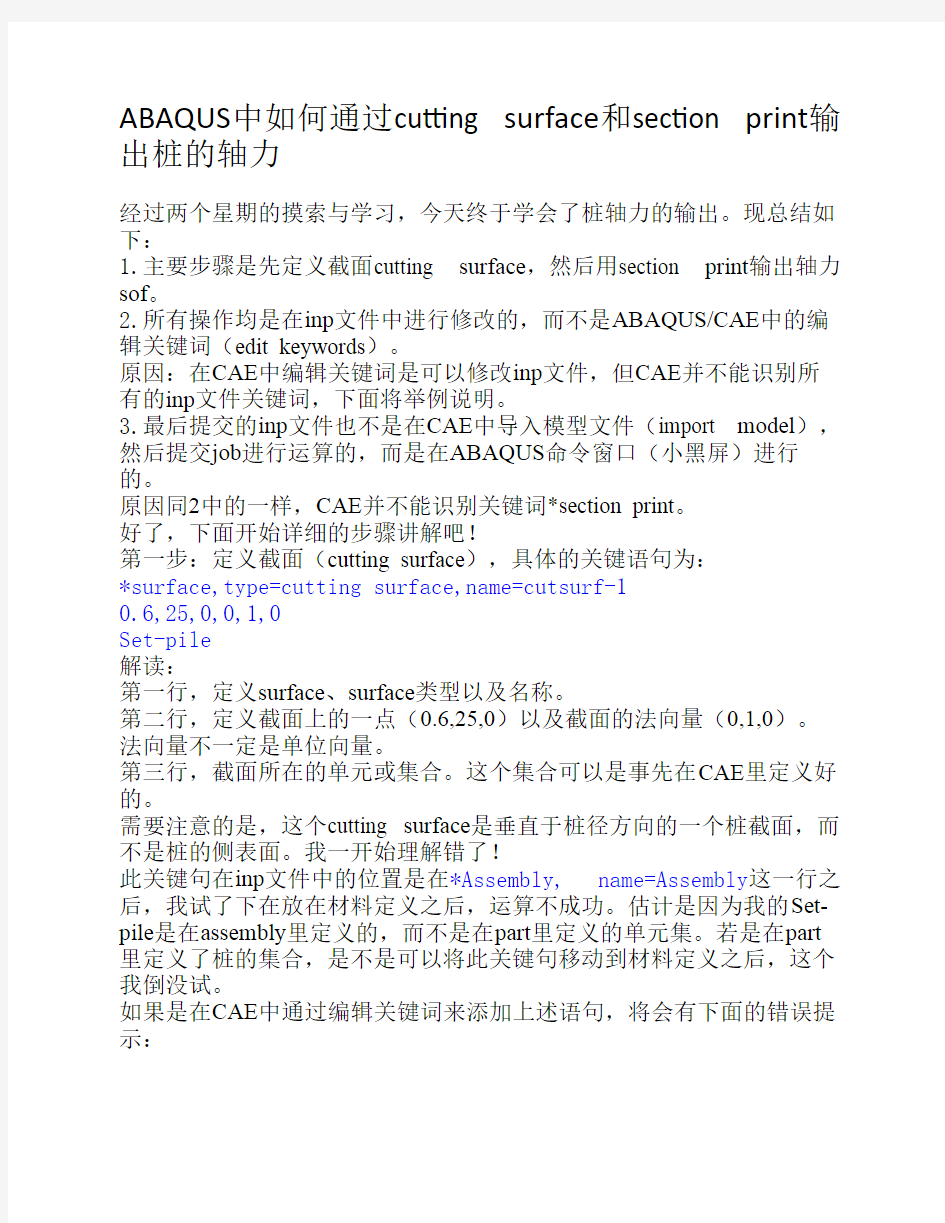

ABAQUS中如何通过cutting surface和section print输出桩的轴力
经过两个星期的摸索与学习,今天终于学会了桩轴力的输出。现总结如下:
1.主要步骤是先定义截面cutting surface,然后用section print输出轴力sof。
2.所有操作均是在inp文件中进行修改的,而不是ABAQUS/CAE中的编辑关键词(edit keywords)。
原因:在CAE中编辑关键词是可以修改inp文件,但CAE并不能识别所有的inp文件关键词,下面将举例说明。
3.最后提交的inp文件也不是在CAE中导入模型文件(import model),然后提交job进行运算的,而是在ABAQUS命令窗口(小黑屏)进行的。
原因同2中的一样,CAE并不能识别关键词*section print。
好了,下面开始详细的步骤讲解吧!
第一步:定义截面(cutting surface),具体的关键语句为:
*surface,type=cutting surface,name=cutsurf-1
0.6,25,0,0,1,0
Set-pile
解读:
第一行,定义surface、surface类型以及名称。
第二行,定义截面上的一点(0.6,25,0)以及截面的法向量(0,1,0)。法向量不一定是单位向量。
第三行,截面所在的单元或集合。这个集合可以是事先在CAE里定义好的。
需要注意的是,这个cutting surface是垂直于桩径方向的一个桩截面,而不是桩的侧表面。我一开始理解错了!
此关键句在inp文件中的位置是在*Assembly, name=Assembly这一行之后,我试了下在放在材料定义之后,运算不成功。估计是因为我的Set-pile是在assembly里定义的,而不是在part里定义的单元集。若是在part 里定义了桩的集合,是不是可以将此关键句移动到材料定义之后,这个我倒没试。
如果是在CAE中通过编辑关键词来添加上述语句,将会有下面的错误提示:
第二步:定义输出(section print),具体的关键语句为:
*section print,name=secprint-1,surface=cutsurf-1
sof,som
解读:
第一行,定义输出的名称及截面。
第二行,定义输出选项,sof为截面合力,som为截面弯矩。
注意,此处第一行surface=**必须是上一步中cutting surface的名称
(name=**),因为要输出的就是第一步定义的截面轴力及弯矩。如果
此处乱写surface=?的话,估计到最后什么也输出不了了。
有些人还在第一句后面加上了axes=local,frequency=1,update=yes,
由于我的模型较简单,也就没管这几个东西。除了命名之外,inp文件
中的大小写英文字符,是没有区别的。所以大家不要再犹豫写
*SECTION PRINT还是*section print……
此关键句在inp文件中的位置是最后一个** HISTORY OUTPUT: H-
Output-3之后,*Output, history, variable=PRESELECT之前。也就是
我的inp文件中的倒数第四和第三行。如果放错了位置,估计也会引起
不识别等问题,最终导致无输出结果。
如果是在CAE中通过导入inp文件来进行运算,在导入时,CAE下方窗
口将会有下述警告信息:
WARNING: The following keywords/parameters are not yet supported by the --------------------------------------------------------------
-------------------
*SECTIONPRINT
The model "Job-20101215" has been imported from an input file.
Please scroll up to check for error and warning messages.
这再次验证了,ABAQUS/CAE是不能识别关键词*section print的。强制
提交job是可以运算的,但是在最后的dat结果文件里没用任何输出结
果。
第三步:保存并提交inp文件。
在保存之前需要仔细检查上面关键语句的位置及拼写,以及是否含有中
文字符。
然后就可以在ABAQUS命令窗口提交inp文件进行运算了。具体操作
是:开始→所有程序→Abaqus 6.9.1→Abaqus Command
输入:
abaqus job=***.inp(就是你刚才修改的inp文件名)
回车即可。
然后黑屏窗口会弹出一个警告语句:
Abaqus Warning:The .inp extension has been removed from the job indentif 大概意思是说,后缀.inp被省略。由此可判断,在上面输入的时候,完
全可以不写后缀名字。我之所以写了,是因为我的默认工作路径
D:\Temp下还有个跟inp文件完全同名的.cae文件,而如果这两个文件信
息不是完全一样的话,建议还是加上.inp后缀为好。
到此,计算完毕。黑屏窗口并不会像CAE那样提示job completed
或ANSYS中的solution is done!(害得我还以为没反应…… -_- 汗!)
默认工作路径下已经生产了结果文件 .com .dat .log .msg .odb .prt .sta等
一系列后缀文件。
第四步:提取数据
用记事本打开刚才生产的.dat文件,在最下面会找到想要的输出结果
THE FOLLOWING TABLES ARE PRINTED
SOFM SOF1 SOF2 SOF3
1.0556E+06 4.0515E+04 1.0548E+06 0.000
三个方向的sof,以及合力SOFM。
需要注意的是,此sof值是合应力,单位为N。无需乘以截面面积……
至此,大功告成!
后话:
(1)本人查看了仿真论坛里的一些帖子,发现输出轴力的方法有三:
?后处理模块中运用free body cut,此法较为方便简单,可直
接得到截面合力,无奈我的模型是二维轴对称的,不能进行
自由体切割。
Displaying a free body cut
You can define a free body cut to view the resultant forces
and moments transmitted across a selected surface of a
model. Force vectors are displayed with a single arrowhead
and moment vectors with a double arrowhead.
To create a free body cut:
1. To display the entire model in the viewport,
select Tools Display Group Plot All from the main menu bar.
2. From the main menu bar, select Tools Free Body
Cut Manager.
3. Click Create in the Free Body Cut Manager.
4. From the dialog box that appears, select 3D
element faces as the Selection method and
click Continue.
5. In the Free Body Cross-Section dialog box,
select Surfaces as the Item and Pick from
viewport as the Method.
6. In the prompt area, set the selection method to by
angle and accept the default angle.
7. Select the surface, highlighted in Figure 4–33, to
define the free body cut cross-section.
a. From the Selection toolbar, toggle off
the Select the Entity Closest to the
Screen tool and ensure that the Select
From All Entities tool is selected.
b. As you move the cursor in the viewport,
Abaqus/CAE highlights all of the potential
selections and adds ellipsis marks (...) next to
the cursor arrow to indicate an ambiguous
selection. Position the cursor so that one of the
faces of the desired surface is highlighted, and
click to display the first surface selection.
Figure 4–33 Selected faces for the free body cross-section.
c. Use the Next and Previous buttons to cycle
through the possible selections until the
appropriate vertical surface is highlighted, and
click OK.
8. Click Done in the prompt area to indicate your
selection is complete. Click OK in the Free Body
Cross-Section dialog box.
9. In the Edit Free Body Cut dialog box, accept the
default settings for the Summation Point and
the Component Resolution. Click OK to close the
dialog box.
10. Click Options in the Free Body Cut Manager.
11. From the Free Body Plot Options dialog box,
select the Force tab in the Color & Style tabbed
page. Click the resultant color sample to change the color of the resultant force arrow.
12. Once you have selected a new color for the
resultant force arrow, click OK in the Free Body
Plot Options dialog box and click Dismiss in
the Free Body Cut Manager.
The free body cut is displayed in the viewport, as shown in Figure 4–34.
Figure 4–34 Free body cut displayed on the connecting lug.
?输出截面上的应力值进行积分运算,主要方法是创建路径(path)或者拾取节点应力值,桩身的网格越密集,最后的积分值越精确,此法我已学会。
?cutting surface和section print联合使用,由于手动修改inp文件,此法最复杂,而且不知道最终的sof值,软件是如何算出来的。如果需要得到桩深方向N个截面的轴力,就需要在cutting surface里定义N个截面。
(2)特别感谢仿真论坛的zsq-w总斑竹、shanhuimin923斑
竹、firce、laoyao239以及ABAQUS-岩土群(84418357)里的◆羽出惊人◆(274550165)。
ABAQUS6.10支持cae定义截面,这样不需要在inp里定义截面三要素(截面上任意一个点、截面法线、截面所在的集合Set),从而方便很多。
同时,cae支持定义多个截面,在inp里添加多条输出语句,最后都能在dat文件中找到sof和som。
值得一提的是,后处理free body cut同样可以输出之前cae定义好的截面上的弯矩和轴力。经验证,和sof、som输出值一模一样。
方法一:
**定义切平面
*surface,type=cutting surface,name=fifth-ring-up
**定义输出——(SOM为截面总弯矩,SOF为截面合力)
*section print,name=forcemoment,surface=fifth-ring-up,update=yes
SOM, SOF
注意:关键词surface和section print的用法可以参见abaqus帮助/Abaqus Keywords Referrence Manual 以及Abaqus/CAE User's Manual等。
方法二:
首先需要导出节点应力,节点应力可以:(1)从Visualization/Report/Field output里选择
Unique Nodal导出;(2)由于节点应力不能直接在inp中关键词输出,但是可以在inp文件中将节点附近单元应力导出,然后取平均值即可;语法为:
*el print, elset=fifth-ring-outside-el
s
将截面内外节点的应力值求出后,用材料力学方法求解。